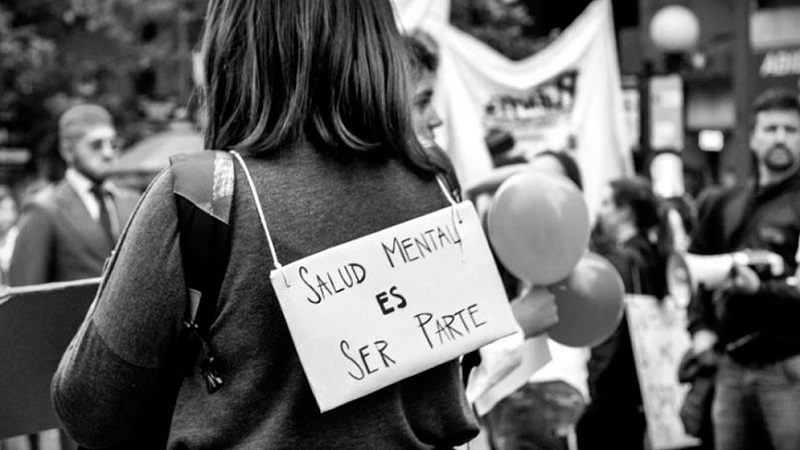
Workers, along with users of mental health devices, call on the community to participate in the 16th Latin American Festival and Congress of Art towards demancomialization, which will take place this year in Neuquén on October 17 and 18 . The days will end with a march for the right to Mental Health under the motto “When cruelty advances, mental health is organized.”
“These conferences were held every two years in the city of Chapadmalal, organized by the Argentine Network of Art and Mental Health. This year has a particularity: due to the cutback and adjustment policies of the national government, this complex was closed, and from this network it was decided that the festival would be held regionally. This enhances the organization, since will take place in different provinces of the country, each one with its imprint”he explained Luciana Bravosocial worker and member of the Mental Health Network.
The Patagónica region has references such as La Ventana Magazine, Espacio Amigable, Theater of the Oppressed “El Humo”, Art Workshop “La Fuga” in Neuquén and the Creative Workshop “Apalabrando” in Cipolletti. These They are artistic spaces that promote community mental health, with the intention that art contributes to demancomializing processes..
In Neuquén, the art and mental health days will take place on October 17 and 18 from 9:30 a.m. to 5:00 p.m. “It will have different art workshops, plays, screen printing and film debates, because we understand that art is transformative and we think it is extremely important that the community can participate in each of these spaces,” says Luciana Bravo.
He Thursday will be carried out simultaneously in the Deriva Teatro and Fernández Rego halls.

He Fridayactivities will focus on the Fernández Rego Room and at 6 p.m. they will mobilize from the monument to San Martín.

The motto of the march this year will be “When cruelty advances, mental health organizes itself,” because we want less repression, less hunger and more health”, dice Miriam Rivassocial worker and member of the Network. She explains that they understand health as a comprehensive concept: “This march and this festival arise within the framework of thinking about health from a comprehensive approach. This means that everything related to group work, group devices and cultural creativity positively impacts the health of people both individually and as a community.”

“The successive governments of the province have not had clear and forceful policies in the area of mental health,” denounces Rivas and demands that everything stipulated in the national law, which is almost 14 years old, be complied with. “It is the right of people, of the community to assistance, to prevention activities, to achieve accessibility in the public health system.”
The reality of mental health services in the province is very different from what the law says. “Various problems are arising that are getting deeper. The Minister of Health announced a health plan with great fanfare, but we really did not find it reflected anywhere; These are just very general questions. Unfortunately, everything related to the areas of mental health and assistance is done quite by heart”.
The festival and march space also aims to make visible this reality that health teams experience and denounce the current situation regarding the implementation of the National Mental Health Law in the province. “A few weeks ago the minister presented the Provincial Mental Health Plan. He said that it was an ‘à la carte’ plan but did not mention the specific problems that will be worked on as the main lines of action. It also does not indicate what the assigned budget is,” says Luciana Bravo, a worker at the Valentina Rural Health Center.

The official announcements go against what happens in the different psychosocial services that operate in health centers and hospitals. “The demand related to various mental health problems has grown exponentially due to the socioeconomic crisis that the country is going through.. That is why we think it is important to demonstrate in the streets, denouncing but also demanding that the rights of the population be fulfilled.”
The Legislature of Neuquén declared the festival of interest
The deputy of the Left Front Andrés Blanco, asked the different blocks to support the draft declaration of interest requested by the devices that are part of the Argentine Network of Art and Mental Health.
Blanco explained that within the framework of the mental health law, these devices consider art as a tool for the treatment of people with mental illnesses. They promote outpatient and community treatment to avoid institutionalization in monovalent hospitals, asylum treatment, and dehumanized treatment.
He also recognized the work of health personnel in maintaining the care of the population. “We salute each of the colleagues who take on this task,” he said and invited the deputies to make a financial contribution to the realization of the festival. “I invite those who want to collaborate, a note was sent to all the blocks, whatever is possible, but the important thing is that we can collaborate so that they can hold this festival and this congress.”
Source: www.laizquierdadiario.com

